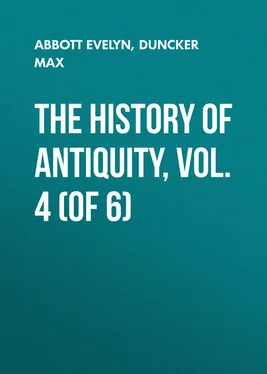Max Duncker - The History of Antiquity, Vol. 4 (of 6)
Здесь есть возможность читать онлайн «Max Duncker - The History of Antiquity, Vol. 4 (of 6)» — ознакомительный отрывок электронной книги совершенно бесплатно, а после прочтения отрывка купить полную версию. В некоторых случаях можно слушать аудио, скачать через торрент в формате fb2 и присутствует краткое содержание. Жанр: foreign_antique, foreign_prose, Историческая проза, на английском языке. Описание произведения, (предисловие) а так же отзывы посетителей доступны на портале библиотеки ЛибКат.
- Название:The History of Antiquity, Vol. 4 (of 6)
- Автор:
- Жанр:
- Год:неизвестен
- ISBN:нет данных
- Рейтинг книги:5 / 5. Голосов: 1
-
Избранное:Добавить в избранное
- Отзывы:
-
Ваша оценка:
- 100
- 1
- 2
- 3
- 4
- 5
The History of Antiquity, Vol. 4 (of 6): краткое содержание, описание и аннотация
Предлагаем к чтению аннотацию, описание, краткое содержание или предисловие (зависит от того, что написал сам автор книги «The History of Antiquity, Vol. 4 (of 6)»). Если вы не нашли необходимую информацию о книге — напишите в комментариях, мы постараемся отыскать её.
The History of Antiquity, Vol. 4 (of 6) — читать онлайн ознакомительный отрывок
Ниже представлен текст книги, разбитый по страницам. Система сохранения места последней прочитанной страницы, позволяет с удобством читать онлайн бесплатно книгу «The History of Antiquity, Vol. 4 (of 6)», без необходимости каждый раз заново искать на чём Вы остановились. Поставьте закладку, и сможете в любой момент перейти на страницу, на которой закончили чтение.
Интервал:
Закладка:
This spirit of prayer is a creation of the priestly families, a reflected expression of that power and compulsion which from all antiquity the Indians believed could be exercised upon spirits, and which they attribute to the power of meditation. The name of this deity no less than his abstract nature is a proof of his later origin. He is called Brahmanaspati, i. e. lord of prayer. "Brahmanaspati," we are told in the Vedas, "pronounces the potent form of prayer, where Indra, Varuna, Mitra, and the gods have made their dwellings." 159The lord of prayer, the leader of songs, the creator of the songs by which the gods grow, and who gives them power, the "bright, gold-coloured," has in reality done the deeds of Indra. "He has cleft the clouds with his lightning, opened the rich hollow of the mountains (the hidden streams), driven the cows from the mountains, poured forth streams of water, chased away the darkness with his rays, has brought into being the dawn, the clear sky, and fire." 160Thus did the priests transfer the achievements of the old god of storm and battle to their new god, their own especial protector, whom they now make the possessor of all divine attributes, and the father of gods. As this spirit was concealed, and lived in the acts of sacrifice, in the priests who offered it, in their prayers and meditations, and, on the other hand, had a power over the gods, guiding them and compelling them, Brahmanaspati, the spirit of the cultus, the mysterious force, the magic power of the rite, became with the priests the Holy, an impersonal essence, which at last was looked on by the priests as "Brahman." 161It was not with the lightning, but with the Brahman, i. e. with the power of the Holy, that Indra burst asunder the cave of Vritra. 162
In Brahmanaspati the priests found a special god for their order and vocation; they were also at the same time carried beyond the circle of the ancient gods, whose forms had sprung up on a basis of natural powers; they had arrived at a transcendental deity emanating from the mysterious secret of their worship. It was a step further on the same path to resolve Brahmanaspati into Brahman, the Sacred Being. Nevertheless, even in the latest poems of the Veda, Brahman still coincides with Brahmanaspati, with the power of meditation and prayer. 163But by degrees, in the eager desire to detach the unity of the divine power from the plurality of divine shapes, and find the one in the other, Brahman is elevated far above this signification; it becomes the ideal union of all that is sacred and divine, and is elevated into the highest divine power. If the Holy nourishes, leads, and constrains the gods, it is mightier than the gods, the mightiest deity, and therefore the most divine. If the Holy constrains the gods, and at the same time gives them power, in it alone the special power of the gods can rest, in so far as it is in them: the greater the portion they have in it, the mightier are they. The self-concentrated Holy is the mightiest power, the essence of all gods, the deity itself. Thus the oneness of nature in the gods, their unity and the connection between them, was discovered. Yet, this Holy, or Brahman, was not in heaven only, but also existed on earth; it lived in the holy acts and in those who performed them; in the ritual and prayer, in meditation and heaven-ward elevation of spirit, in the priests. Thus there stood upon the earth a holy and an unholy world in opposition to each other; the world of the priests and of the laity, the holy order of the priests and the unholy orders of the Kshatriyas, Vaiçyas, and Çudras.
It was the power of meditation and prayer, of the holy word, which with the priests had shaped itself into the divine power, the essence of the divine, and had thus driven out the more ancient gods. From another side this change was aided by ideas which the nature of the land of the Ganges forced upon the Aryas. It was not merely that the climate compelled them to rest, and thus won, for the priests more especially, leisure for contemplation, reflection, and minute investigation – all tendencies natural to the Aryas. Little care for his maintenance was required from the man who went into the forest to pursue his thoughts and dreams. There, instead of the hot sun which ripened the sugar-cane and shone on the fields of rice, was cool shade under the vast bananas and fig-trees; in the fruits growing wild in the forest, he found sufficient food. The gods invoked in the land of the Indus had been the spirits of light, of the clear sky, of the winds, the helpful force of fire, the rain-giving power of the storm-god. It was the bright, friendly, beneficial phenomena and gifts of the heavens and nature which were honoured in Indra and Mitra, in Varuna, Surya, and Agni. On the Ganges the Aryas found themselves surrounded by a far more vigorous natural life. They were in the midst of magnificent forms of landscape, the loftiest mountains, the mightiest rivers; around them was a vegetation unwearied in the luxuriance of its ceaseless growth, throwing up gigantic leaves and stems, and creepers immeasurable. They saw on every side a bright-coloured and marvellous animal world; glittering birds, hissing serpents, the colossal shapes of the elephant and rhinoceros. The multifarious forms of their gods had impelled them to seek for a single source, a point of unity among them, and the same impulse was roused by the wealth, variety, and bewildering abundance of this natural life, which in quick alternation of blossom and decay, went on creating without rest, under shapes the most various. The more variegated the pictures formed by this rich nature in the lively fancy of the Indians, the more confusing this change and multitude, the stronger was the effort required of the mind in order to grasp the unity, the single source, of all this mighty stream of life. To the old gods the phenomena and operations of a wholly different region and climate had been ascribed, but here life was far more varied and luxuriant; here there was no contest of fruitful land with desert, of the spirits of drought with the god of the storm. On the contrary, the inundations of the Ganges displayed a fixed and regular revolution, and in every kind of growth and decay there was a constant unalterable order. Who, then, was the author and lord of these mighty pulses of life, and this order, which seemed to exist of themselves? What was the element of existence and continuance in this alternation of growth and decay? When once men had come to regard the wonderful life of the Ganges as a whole picture, as one, that life was naturally ascribed to some one comprehensive form of deity, to one great god. The meditation of the priests finally brought them to the result that the dust, earth, and ashes, into which men, animals, and plants fell and disappeared could be neither the cause and seat of their own life, nor of the general life. Behind the material and the phenomenon, which could be grasped and seen by the senses, must lie the dim and secret source of existence; behind the external side must be another, inward, immaterial, and invisible. Thus not man only, but all nature, fell into two parts, body and soul. As behind the body of men, so also behind the perishable outward side of nature, there seemed to live a great soul, penetrating through all phenomena, the source and fountain of their being. The priests discovered that behind all the changing phenomena there must exist a single breath, a soul, Atman – it is also called Mahanatma, Paramatman, i. e. "the great soul" 164– and this must be the creative, sustaining, divine power, the source and seat of the life which we behold at one time rising in gladness, at another sinking in exhaustion.
This world-soul was amalgamated with Brahman and denoted by that name. In and behind the prayers and sacred acts an invisible spirit had been discovered, which gave them their power and efficacy, and this holy spirit ruled over the deities, inasmuch as it compelled them to listen to the prayers of men. Behind, above, and in the gods, the nature of the Holy was all-powerful; and it was the divine, the highest form of deity. The same spirit must be sought for behind the great and various phenomena of the life of nature. There must be the same spirit ruling in both spheres, a spirit which existed at once in heaven and on earth, which gave force to the prayers of the Brahmans, and summoned into life the phenomena of nature, and caused the latter to move in definite cycles, which was also the highest god and the lord of the gods. Thus the sacred spirit ruling over the gods became extended into a world-soul, penetrating through all the phenomena of nature, inspiring and sustaining life.
Читать дальшеИнтервал:
Закладка:
Похожие книги на «The History of Antiquity, Vol. 4 (of 6)»
Представляем Вашему вниманию похожие книги на «The History of Antiquity, Vol. 4 (of 6)» списком для выбора. Мы отобрали схожую по названию и смыслу литературу в надежде предоставить читателям больше вариантов отыскать новые, интересные, ещё непрочитанные произведения.
Обсуждение, отзывы о книге «The History of Antiquity, Vol. 4 (of 6)» и просто собственные мнения читателей. Оставьте ваши комментарии, напишите, что Вы думаете о произведении, его смысле или главных героях. Укажите что конкретно понравилось, а что нет, и почему Вы так считаете.












